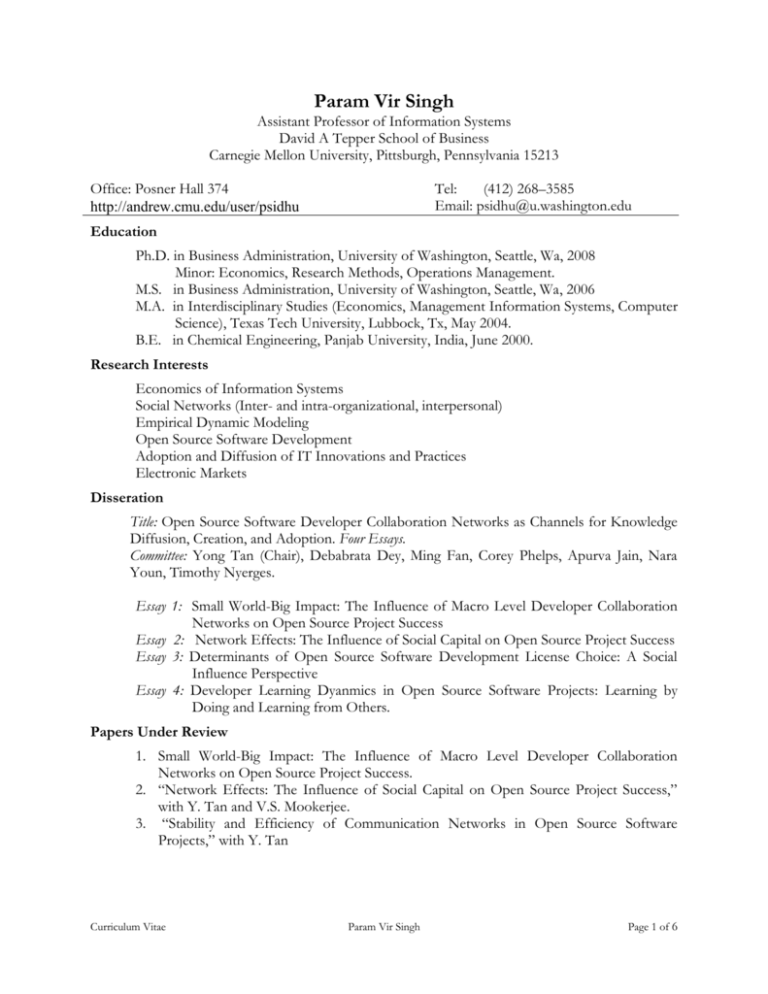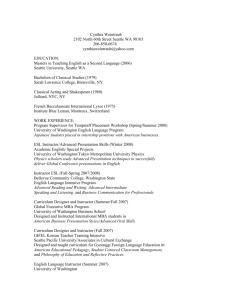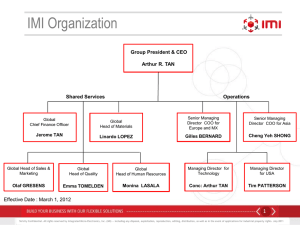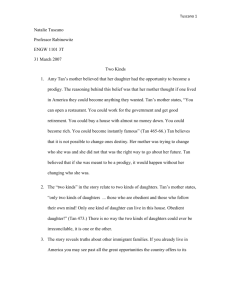paramvita.doc - Andrew.cmu.edu
advertisement

Param Vir Singh Assistant Professor of Information Systems David A Tepper School of Business Carnegie Mellon University, Pittsburgh, Pennsylvania 15213 Office: Posner Hall 374 http://andrew.cmu.edu/user/psidhu Tel: (412) 268–3585 Email: psidhu@u.washington.edu Education Ph.D. in Business Administration, University of Washington, Seattle, Wa, 2008 Minor: Economics, Research Methods, Operations Management. M.S. in Business Administration, University of Washington, Seattle, Wa, 2006 M.A. in Interdisciplinary Studies (Economics, Management Information Systems, Computer Science), Texas Tech University, Lubbock, Tx, May 2004. B.E. in Chemical Engineering, Panjab University, India, June 2000. Research Interests Economics of Information Systems Social Networks (Inter- and intra-organizational, interpersonal) Empirical Dynamic Modeling Open Source Software Development Adoption and Diffusion of IT Innovations and Practices Electronic Markets Disseration Title: Open Source Software Developer Collaboration Networks as Channels for Knowledge Diffusion, Creation, and Adoption. Four Essays. Committee: Yong Tan (Chair), Debabrata Dey, Ming Fan, Corey Phelps, Apurva Jain, Nara Youn, Timothy Nyerges. Essay 1: Small World-Big Impact: The Influence of Macro Level Developer Collaboration Networks on Open Source Project Success Essay 2: Network Effects: The Influence of Social Capital on Open Source Project Success Essay 3: Determinants of Open Source Software Development License Choice: A Social Influence Perspective Essay 4: Developer Learning Dyanmics in Open Source Software Projects: Learning by Doing and Learning from Others. Papers Under Review 1. Small World-Big Impact: The Influence of Macro Level Developer Collaboration Networks on Open Source Project Success. 2. “Network Effects: The Influence of Social Capital on Open Source Project Success,” with Y. Tan and V.S. Mookerjee. 3. “Stability and Efficiency of Communication Networks in Open Source Software Projects,” with Y. Tan Curriculum Vitae Param Vir Singh Page 1 of 6 Publications 1. “Open Source Software and the Small World Phenomenon: An empirical Investigation of Macro Level Network Properties on Project Success,” Proceedings of International Conference on Information Systems (ICIS) 2007, forthcoming. 2. “Social Capital, Structural Holes and Team Composition: Collaborative Networks of the Open Source Software Community,” with Y. Tan and V.S. Mookerjee, Proceedings of International Conference on Information Systems (ICIS) 2007, forthcoming. 3. “Determinants of Open Source Software Development License Choice: A Social Influence Perspective,” with C.Phelps, M. Fan and Y. Tan, Proceedings of Workshop on Information Systems and Economics (WISE) 2007, forthcoming. 4. “Collaboration Software Development and the Small World Phenomenon,” Informs Annual Meeting 2007. 5. “Is The Business Model Broken? A model of the Difference between Pay-Now and PayLater Contracts in IT outsourcing,” with E. Walden, in Marc J. Schniederjans, Ashlyn M. Schniederjans, and Dara G. Schniederjans eds., Outsourcing Management Information Systems 2007. 6. “Planning to First Release: A Conditional Hazard Function Approach for Investigating Open Source Software Development Time,” with Y. Tan, Proceedings of Workshop on Information Technology and Systems (WITS) 2006, 127-132. 7. “On the Introduction of New Products in a Monopoly IT Market,” with T. Klastorin, International Informs Meeting 2006. 8. “Stability and Efficiency of Communications Networks in Open Source Software Development,” with Y. Tan, Proceedings of Workshop on Information Technology and Systems (WITS) 2005, 177-182. 9. “New Product Planning in a Monopoly IT Market,” with T. Klastorin, Informs Annual Meeting 2005. 10. “Optimal Policies for E-commerce Sites with Hybrid Revenue Streams: Differentiated Quality Approach,” with S. Kumar, Proceedings of Workshop on Information Technology and Systems (WITS) 2004, 98-103. 11. “Flexibility and Cost in Information Technology Outsourcing: Balancing Opposing Goals,” with E. Walden, Proceedings of Americas Conference if Information Systems (AMCIS) 2003, 1653-1663. Nominated for Best Paper. Working Papers 1. "Developer Learning Dyanmics in Open Source Software Projects,” with Y. Tan and N. Youn, Under review at Management Science. 2. “Determinants of Open Source Software Development License Choice: A Social Influence Perspective,” with C. Phelps, M. Fan and Y. Tan, Status: Under final preparation for submission to Management Science. Expected submission date: 01/08. 3. “Do Board of Director Networks Affect Target Choice and Subsequent Performance in Mergers and Acquisitions?,” with R. Schonlau, Status: Preliminary data analysis completed, Target: Journal of Finance. Expected submission date: 04/08. Invited Presentations 1. “Collaboration Software Development and the Small World Phenomenon,” Informs Annual Meeting 2007, Seattle, Washington, forthcoming, Nov 4. 2. “New Product Planning in a Monopoly IT Market,” Informs Annual Meeting 2005, San Francisco, California. Curriculum Vitae Param Vir Singh Page 2 of 6 3. “Stability and Efficiency of Open Source Communication Networks,” Doctoral Consortium, Center for International Business Education and Research, Seattle, Washington, 2005. 4. “Small World-Big Impact: The Influence of Macro Level Developer Collaboration Networks on Open Source Project Success” Department of Sociology, University of Washington Presentation, 2007. 5. “Developer Learning Dynamics in Open Source Projects,” Carnegie Mellon University 2008. 6. Other Presentations 1. 2. 3. 4. 5. 6. 7. 8. “Social Capital, Structural Holes and Team Composition: Collaborative Networks of the Open Source Software Community,” ICIS 2007, Montreal, Quebec, forthcoming, Dec 12. “Open Source Software and the Small World Phenomenon: An empirical Investigation of Macro Level Network Properties on Project Success,” ICIS 2007, Montreal, Quebec, forthcoming, Dec 10. “Determinants of Open Source Software Development License Choice: A Social Influence Perspective,” WISE 2007, Montreal, Quebec, forthcoming, Dec 8-9. “Planning to First Release: A Conditional Hazard Function Approach for Investigating Open Source Software Development Time,” WITS 2006, Milwaukee, Wisconsin. “The Small World Phenomenon: Influence on Open Source Software Development,” North West Summit, Seattle, 2007. “Stability and Efficiency of Communications Networks in Open Source Software Development,” WITS 2005, Las Vegas, Nevada. “Optimal Policies for E-commerce Sites with Hybrid Revenue Streams: Differentiated Quality Approach,” WITS 2004, Washington D.C. Department of Information Systems and Operations Management, University of Washington, Seminar Presentations: ― “Stability and Efficiency of Communications Networks in Open Source Software Projects” ― “New Product Planning in a Monopoly IT Market” ― “Developer Learning Dynamics in Open Source Software Projects: A Hidden Markov Model Analysis” ― “Determinants of Open Source Software Development License Choice: A Social Influence Perspective” Honors ― Awarded $5000 research grant by the Center for organizational learning, innovation and performance, Carnegie Mellon university, 2008. ― Awarded Dean's Achievement Award 2005-2006 (Awarded to the best student in the PhD program across all areas in the Business School based on performance in research, course work, and comprehensive exam over the first 2 and a 1/2 years) ― Awarded University of Washington Graduate School Top Scholar Award (2004-2005) ― Foster Endowed Fellowship dissertation funding, 2007 and 2008. ― Nominated for University of Washington Business School Instructor of the Quarter award, Winter 2007. Curriculum Vitae Param Vir Singh Page 3 of 6 ― Best Paper Nomination for AMCIS, Tampa, Florida, 2003 ― Participant at Doctoral Consortium, Center for International Business Education and Research, Seattle, Washington, 2005. Reviewer Management Science, Information Systems Research, Marketing Science, INFORMS Journal on Computing, ICIS, WITS. References Yong Tan Associate Professor of Information Systems Evert McCabe Faculty Fellow Michael G. Foster School of Business University of Washington Box 353200, Seattle, WA 98195, USA Tel: (206) 616-6785 Fax: (206) 543-3968 Email: ytan@u.washington.edu Vijay S. Mookerjee Charles and Nancy Davidson Distinguished Professor of Information Systems School of Management University of Texas at Dallas SOM 3.429, Richardson, TX 75083, USA Tel: (972) 883-4414 Fax: (972) 883-2089 Email: vijaym@utdallas.edu Debabrata Dey Professor of Information Systems and Evert McCabe Endowed Fellow Chair, Dept. of ISOM Michael G. Foster School of Business, University of Washington Box 353200, Seattle, WA 98195, USA Tel: (206) 543-1855 Fax: (206) 543-3968 Email: ddey@u.washington.edu Theodore Klastorin Professor of Operations Management Professor in Manufacturing Management Adjunct Professor of Health Services Michael G. Foster School of Business University of Washington Box 353200, Seattle, WA 98195, USA Tel: (206) 543-1833 Fax: (206) 543-3968 Email: tedk@u.washington.edu Corey Phelps Assistant Professor of Management and Organization Michael G. Foster School of Business University of Washington Box 353200, Seattle, WA 98195, USA Tel: (206) 543- 6579 Fax: (206) 543-3968 Email: cphelps@u.washington.edu Curriculum Vitae Param Vir Singh Page 4 of 6 Coursework Coursework listed only includes those PhD level courses directly relevant to my research. Econometrics Econometrics I, II, and III: statistical modeling to empirical work in economics; methods, tools, and theory of econometrics as the basis for empirical investigation in economics; ordinary least square, hypothesis testing, non linear regression, generalized least squares, instrumental variable estimation, maximum likelihood estimation, discrete and limited dependent variables, seemingly unrelated regressions. Text: Econometric Theory and Methods by Davidson amd Mackinnon; Econometric Analysis by Greene Instructors: Steinmeier, Parks Econometric Theory: generalized methods of moments and time series analysis. Texts: Time Series Analysis by Hamilton; Generalized Methods of Moments by Hall Instructor: Zivot Applied Microeconometrics: instrumental variables, measurement error, simultaneous equation modeling, panel data, sibling models, difference in differences, group effects, models with qualitative and limited dependent variables, duration models, event study analysis Text: Econometric Analysis of Cross Section and Panel Data by Wooldridge Instructor: Rose Micro Economics Microeconomics Analysis I, II and III: fundamental methodology and models of microeconomic theory, expected utility theory, theories of industrial organizations, and various topics in general equilibrium and welfare economics, game and information theory. Texts: Microeconomic Theory by Mas-Colell, Whinston and Green; Game theory by Fudenberg and Tirole Instructors: Hartman, Khalil, Silberberg, Kruse Social Networks Networks and Social Structure: theoretical foundations of structural network analysis, principles of balance and transitivity, homophily, the implications of connectivity and density, the relationship between categories and networks, the nature of exchange structures, and power and centrality, specific substantive applications of the network approach. Texts: Social Networks Analysis by Wasserman and Faust; The Handbook of Economic Sociology by Smelser and Swedebrg. Instructor: Stovel Economic Analysis of Strategic Networks and Groups: strategic models of social and economic networks formation, stability and efficiency of social and economic networks, network reliability, dynamic models of network formation, theory of buyer-seller networks. Texts: Networks and Groups: Models of Strategic Formation by Dutta and Jackson Instructor: Tan Strategy Seminar on IS strategy Seminar on Marketing Strategy Curriculum Vitae Param Vir Singh Page 5 of 6 Seminar on IT and Business Intelligence Information, Technology and Innovation Seminar on Foundations of Operations Management Research Key topics covered: Theories of the firm, economics of information systems, theoretical foundations of information technology, information technology impacts on innovation, determinants of business performance, theories of complex organizations, stock return response modeling, datamining concepts, new product development and introduction strategies, durable goods, and spatial competition, project management issues. Instructors: Fan, Jacobson, Dey, Nolan, Kumar, Klastorin Other Methods Courses Bayesian Statistics for Social Sciences: Instructor: Hoff Queuing Theory: Instructor: Moinzadeh Mathematical Programming: Instructor: Faaland Network Optimization: Insturctor: Rockefeller Optimal Control Theory: Instructor: Kumar Curriculum Vitae Param Vir Singh Page 6 of 6






